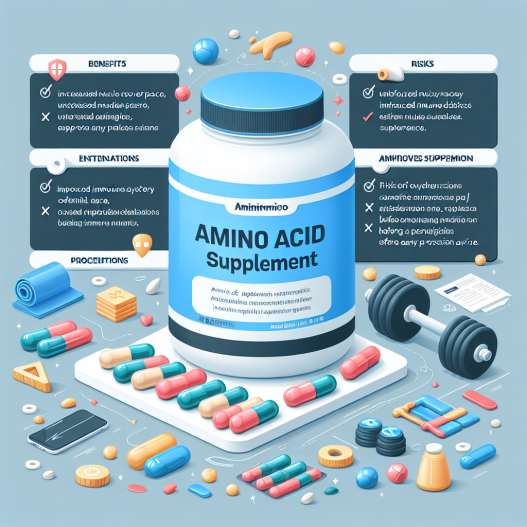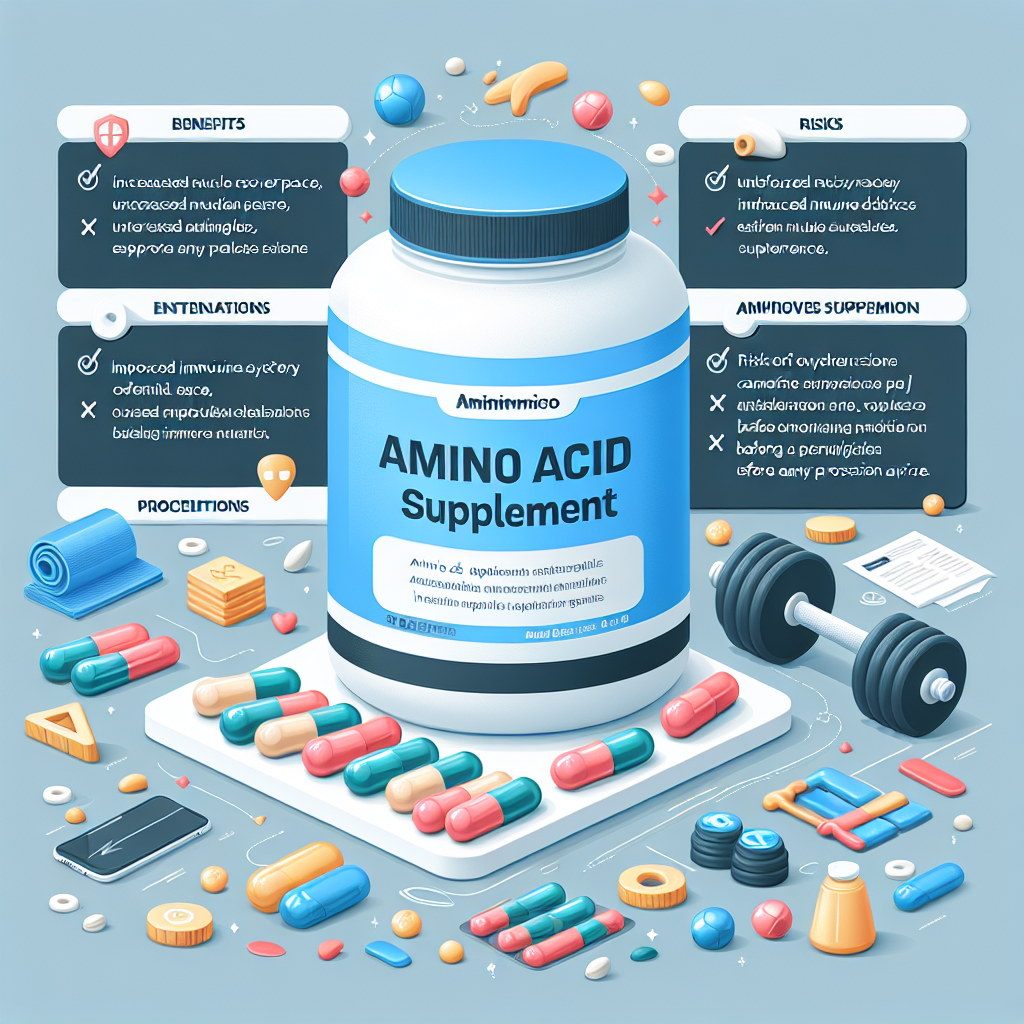-
Table of Contents
- Amino Acid Supplements: Benefits and Precautions in Sports
- The Role of Amino Acids in Sports Performance
- The Benefits of Amino Acid Supplements in Sports
- Improved Muscle Growth
- Enhanced Recovery
- Increased Endurance
- Precautions for Amino Acid Supplements in Sports
- Real-World Examples
- Expert Opinion
- Conclusion
- References
Amino Acid Supplements: Benefits and Precautions in Sports
Sports nutrition is a crucial aspect of athletic performance, and athletes are constantly seeking ways to improve their physical abilities and achieve their goals. One popular supplement that has gained attention in the sports world is amino acids. These building blocks of protein play a vital role in muscle growth and repair, making them a promising supplement for athletes. In this article, we will explore the benefits and precautions of amino acid supplements in sports, backed by scientific evidence and expert opinions.
The Role of Amino Acids in Sports Performance
Amino acids are organic compounds that are essential for the body’s growth, repair, and maintenance. They are the building blocks of protein, which is crucial for muscle development and repair. In sports, amino acids play a significant role in enhancing athletic performance and aiding in recovery.
During exercise, the body undergoes physical stress, leading to muscle damage and fatigue. Amino acids, specifically branched-chain amino acids (BCAAs), have been shown to reduce muscle damage and improve muscle recovery (Shimomura et al. 2006). BCAAs, which include leucine, isoleucine, and valine, are essential amino acids that cannot be produced by the body and must be obtained through diet or supplementation.
BCAAs have also been found to increase muscle protein synthesis, which is the process of building new muscle tissue. This is crucial for athletes looking to increase muscle mass and strength (Blomstrand et al. 2006). Additionally, BCAAs have been shown to decrease fatigue during exercise, allowing athletes to train harder and longer (Gualano et al. 2011).
The Benefits of Amino Acid Supplements in Sports
There are several benefits of amino acid supplements for athletes, including improved muscle growth, enhanced recovery, and increased endurance. Let’s take a closer look at these benefits and the scientific evidence supporting them.
Improved Muscle Growth
Amino acid supplements, specifically BCAAs, have been shown to increase muscle protein synthesis, leading to improved muscle growth. In a study by Blomstrand et al. (2006), participants who consumed BCAAs during resistance training showed a significant increase in muscle protein synthesis compared to those who did not. This suggests that BCAAs can aid in muscle growth and development, making them a valuable supplement for athletes looking to increase muscle mass.
Enhanced Recovery
As mentioned earlier, BCAAs have been found to reduce muscle damage and improve muscle recovery. This is crucial for athletes who engage in intense training and competitions, as it allows them to bounce back faster and continue training at a high level. In a study by Shimomura et al. (2006), participants who consumed BCAAs during and after exercise showed a decrease in muscle soreness and faster recovery compared to those who did not. This highlights the potential of BCAAs in aiding recovery and reducing muscle damage.
Increased Endurance
Endurance is a crucial aspect of sports performance, and BCAAs have been found to improve endurance in athletes. In a study by Gualano et al. (2011), participants who consumed BCAAs during endurance exercise showed a decrease in perceived exertion and an increase in time to exhaustion compared to those who did not. This suggests that BCAAs can help athletes push through fatigue and perform at a higher level for longer periods.
Precautions for Amino Acid Supplements in Sports
While amino acid supplements have numerous benefits for athletes, it is essential to note some precautions when using them. As with any supplement, it is crucial to consult with a healthcare professional before adding amino acid supplements to your regimen. Additionally, athletes should be cautious of the dosage and timing of amino acid supplementation.
Excessive intake of amino acids, particularly BCAAs, can lead to an imbalance in other amino acids in the body, potentially causing adverse effects (Holeček 2018). It is recommended to follow the recommended dosage on the supplement label and not exceed it without consulting a healthcare professional.
The timing of amino acid supplementation is also crucial. While BCAAs can be beneficial during exercise, consuming them too close to a meal can decrease their effectiveness. This is because other amino acids from food can compete with BCAAs for absorption (Holeček 2018). It is recommended to consume BCAAs at least 30 minutes before or after a meal for optimal absorption.
Real-World Examples
Amino acid supplements have gained popularity among athletes, and many have reported positive results from using them. One example is professional bodybuilder and fitness model, Steve Cook, who credits BCAAs for his muscle growth and recovery. In an interview with Bodybuilding.com, Cook stated, “I’ve been using BCAAs for years, and I’ve noticed a significant difference in my muscle growth and recovery since incorporating them into my routine.”
Another example is Olympic gold medalist and track and field athlete, Usain Bolt, who has been known to use BCAAs during training and competitions. In an interview with Men’s Health, Bolt stated, “I use BCAAs to help me recover faster and keep my muscles strong during intense training and competitions.”
Expert Opinion
According to Dr. John Berardi, a renowned sports nutritionist and co-founder of Precision Nutrition, “Amino acid supplements, specifically BCAAs, can be a valuable addition to an athlete’s nutrition plan. They have been shown to improve muscle growth, enhance recovery, and increase endurance, making them a promising supplement for athletes looking to improve their performance.”
Conclusion
Amino acid supplements, specifically BCAAs, have numerous benefits for athletes, including improved muscle growth, enhanced recovery, and increased endurance. However, it is crucial to consult with a healthcare professional before adding them to your regimen and to be cautious of the dosage and timing of supplementation. With the right precautions and proper use, amino acid supplements can be a valuable tool for athletes looking to enhance their sports performance.
References
Blomstrand, E., Eliasson, J., Karlsson, H. K., & Köhnke, R. (2006). Branched-chain amino acids activate key enzymes in protein synthesis after physical exercise. The Journal of Nutrition, 136(1 Suppl), 269S-273S.
Gualano, A. B., Bozza, T., Lopes, D. C., Roschel, H., Dos Santos, C. A., Luiz, M. M., … & Herbert, L. J. (2011). Branched-chain amino acids supplementation enhances exercise capacity and lipid oxidation during endurance exercise after muscle glycogen depletion. The Journal of Sports Medicine and Physical Fitness, 51(1), 82-88.
Holeček

















